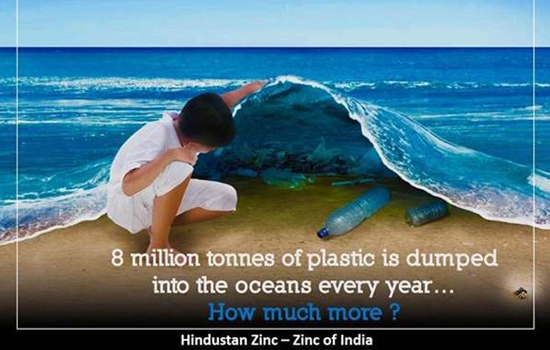
Water makes up to 71% of the Earth’s surface, the other 29% consists of continents and islands. The oceans hold about 96.5 percent of Earths water. But, even such volume of water is affected by plastic waste. Plastic in the ocean threatens the natural habitat of the marine life, disrupting the entire bio-geo cycle.
According to the UN, 8 million tonnes of plastic ends up in the oceans every year. That is the equivalent to 5 grocery bags of plastic trash for 1 foot of coastline around the globe. That is approximately estimated as 51 trillion particles or 236,000 tonnes of microplastics. It is estimated that, every minute, 1 garbage truck of plastic is dumped into our oceans.
Around 1 million seabirds and 100,000 marine mammals are killed every year due to plastic ingestion and polystyrene pieces and plastic nurdles are the most common types of plastic polluting the oceans that make up to the majority of oceanic debris, in addition to plastic bags and food containers. These plastic pieces break apart in the ocean releasing potentially toxic chemicals such as Bisphenol A (BPA), which enters the food cycle web. When marine species mistake the plastic items for food, they ingest the particles and pass toxic chemicals through the food chain, ultimately to our dinner plates.
The Great Garbage Patch in the north Pacific has a concentrated soup of micro plastics, or tiny fragments less than 5 millimeters across. Plastic threatens the existence of the life under water right from smaller fishes to huge mammals and amphibians. Unfortunately, several marine species are on the verge of extinction because of such type of ocean pollution. As plastic debris floats on the seawater, it absorbs dangerous pollutants like PCBs - Polychlorinated Biphenyl, DDT – dichlorodiphenyltrichloroethane (Insecticide) and PAH - Polycyclic aromatic hydrocarbons.
These chemicals are highly toxic and have a wide range of chronic effects, including endocrine disruption and cancer-causing mutations. The concentration of PCBs in plastics floating in the ocean has been documented as 100,000 to 1 million times that of surrounding waters.
Every one desires to walk on the beach. Do walk, as it gives you immense peace of mind, a feeling of warmth and bliss. But it is our duty to ensure that these beaches remain clean and we do not throw plastic waste on these beaches. When sea waves touch these beaches, they take away with it, all the plastic waste, only to make the sea and ocean more polluted.
“Manthan”, an initiative by Hindustan Zinc, is a series of stories to bring awareness about various concerns like air pollution, water pollution, plastic pollution, noise pollution, climate change, road safety and wildlife protection.
Source :
 Water makes up to 71% of the Earth’s surface, the other 29% consists of continents and islands. The oceans hold about 96.5 percent of Earths water. But, even such volume of water is affected by plastic waste. Plastic in the ocean threatens the natural habitat of the marine life, disrupting the entire bio-geo cycle.
Water makes up to 71% of the Earth’s surface, the other 29% consists of continents and islands. The oceans hold about 96.5 percent of Earths water. But, even such volume of water is affected by plastic waste. Plastic in the ocean threatens the natural habitat of the marine life, disrupting the entire bio-geo cycle.